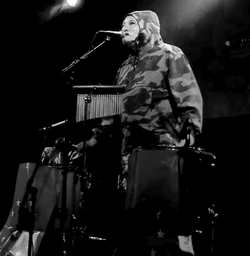Neofolk
Neofolk (not to be confused with neopolka) is a genre of folk music that combines neo-fascist ideologies with acoustic run-of-the-mill indie rock and random metallic clanking. The genre encompasses a wide assortment of lyrical themes, including traditional antisemitism, modern antisemitism and post-modern antisemitism, and is thus popular mainly among dangerous countercultural youth groups and Tolkien fan circles. Musically neofolk is quite nothing to write home about, basically sounding like what Ed Sheeran would sound like if he'd try his hand at black metal.
History[edit | edit source]
The term "neofolk" originates from the late 70's when esoteric music circles began having trouble describing the new compositions of the popular European composers Anonymous and Traditional. These musicians had had respectable, long-running careers in folk music ever since the 11th century, but when the Industrial Revolution happened they began incorporating darker, more industrial elements into their sound. Critics were, at first, at a complete loss of words at this new stylistic departure, but then the words came to them. And The Words were:
| “ | What the fuck is this supposed to be then? It sounds like a neo-nazi taking a shit on top of a lute. | ” |
And so did neofolk get its name, and the rest is history.
Culture[edit | edit source]

The basis of neofolk is built upon being edgy and provocative, and then trying to out-edge and out-provoke all other musicians in the scene. Neofolk musicians aim to "fight against the commercialization of authentic traditional cultures" by even further commercialization of said authentic traditional cultures, and this, allegedly, upsets "'em libtard cucks". However, most neofolk music is banned from stores and streaming platforms worldwide due to the graphic artworks and controversial themes often associated with the genre, thus obscuring the genre away from big audiences and kind of defeating the whole purpose of the self-imposed commercialization.
A large part of the neofolk culture also relies heavily on occultism and esotericism. When neofolk musicians aren't too pre-occupied with citing passages from the Mein Kampf in annoyingly nasal voices against a backdrop of slightly out-of-tune guitars, they head out to the streets and murder random Jewish passers-by in cold blood. But this has nothing to do with the national socialistic aspect of neofolk, as these murders are carried out as ritual sacrifices for Roman deities and, in some more recent cases, merely ironically.
So to sum it all up, the basic principle of belonging to neofolk circles - either as a musician or a listener - is to be included on a government watchlist.
The Amount and Importance of Neofolk Derivatives According To Michel Foucault[edit | edit source]
The amount of neofolk bands and artists are estimated to be on the wrong side of a million, and with each new neofolk project the musicians claim to revolutionize the entire music scene with their generic guitar strumming. It is because of these people that an illusion of "neofolk sub-genres" exists among people involved in the scene despite it all actually sounding the same. In 2003, Michael Foucalt conducted a series of espionage on the Internets and reached the conclusion that "There are more neofolk sub-genres on Earth than intellectuals imagine. And these sub-genres are more active, stronger, more resistant, more passionate than "politicians" think. We have to be there at the birth of neofolk sub-genres, the bursting outward of their force: not in books expressing them, but in events manifesting this force, in struggles carried on around neofolk sub-genres, for or against them. Neofolk sub-genres do not rule the world. But it is because the world has neofolk sub-genres (and because it constantly produces them) that it is not passively ruled by those who are its leaders or those who would like to teach it, once and for all, what it must think."
In other words:
Neofolk Sub-Genres Explained Using the Two Cows Principle[edit | edit source]
- Neofolk - You have two cows. You form a band, wear black uniforms and put a rune on your T-shirts.
- Martial Industrial - You have two cows. You form a band, wear black uniforms and put a rune on your T-shirts.
- Dark Folk - You have two cows. You form a band, wear black uniforms and put a rune on your T-shirts.
- Apocalyptic Folk - You have two cows. You only exist in the Soulseek neofolk chat room.
The Fight Against Neofolk[edit | edit source]
During the 1980s and the early 1990s, the Soviet Union sponsored various anti-neofolk projects under the Zhdanov Doctrine. Prisoners captured by the Soviets were exposed to cheap bootleg versions of western disco hits until the very thought of acoustic guitars made them vomit profusely. Sadly the organized fight against the producers and listeners of neofolk diminished along the fall of the Soviet Union in 1991, which is why the resistance movement can now only resort to writing angry Youtube comments and essays that nobody bothers to read.
Heidegger's Criticism[edit | edit source]
The best known anti-neofolk activist is the German culture critic Martin Heidegger. In his 1993 essay "Seeing is Believing" for the NME-magazine, he openly criticizes neofolk: "What is peddled about nowadays as philosophy, especially that of neofolk, but has nothing to do with the inner truth and greatness of that movement [namely the encounter between global technology and modern humanity] is nothing but fishing in that troubled sea of values and totalities." Sadly, though, nobody cares.

